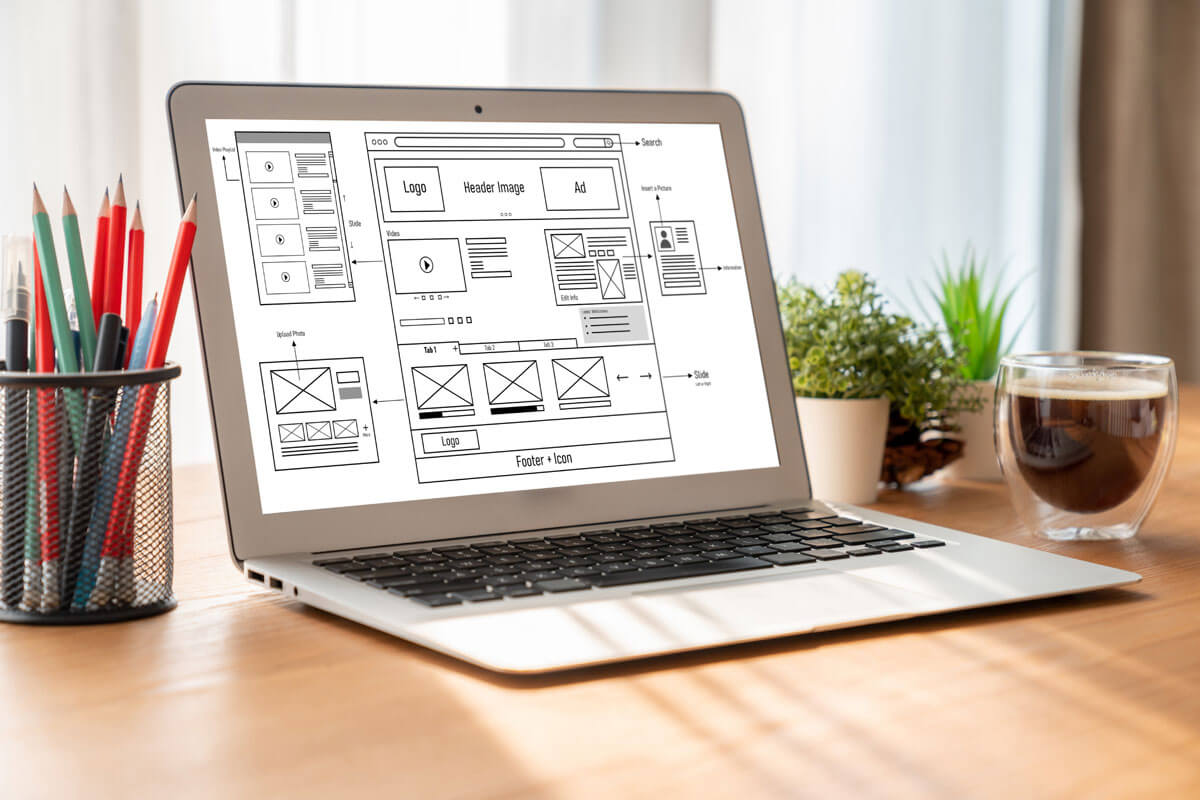Considering creating a website for your company? Or maybe a personal project? It's an exciting endeavor that can significantly expand your online presence and reach. However, before diving in, it's crucial to understand the costs involved clearly.
This guide will break down the various aspects of website budgeting. We will cover topics such as website builders and custom designs. We will also help you estimate the expenses associated with your web project.
Understanding the Basics: How Much Does a Website Cost?
The price of creating a webpage can differ significantly due to different circumstances. A few considerations must be made when designing a website. These factors include the type of site you want to create. Think on the features and functionalities you need.

Image by Freepik
Another factor is the level of design complexity. Lastly, it would help if you decided whether to work with professionals or use DIY tools. In general, there are three main cost components to consider:
Website Builders Cost
Website builders are popular if you're seeking a straightforward and affordable choice. Platforms like Wix, Squarespace, and WordPress offer user-friendly interfaces that allow you to create a site without any coding knowledge. The costs for these builders typically range from $5 to $50 per month, depending on the features and tools you require.
Custom Website Cost
Opting for a custom website design is the way for a more tailored and unique online presence. Custom websites involve hiring web designers and developers to create a site that aligns perfectly with your brand.
The price for a custom website can vary greatly. It starts from around $1,000 and goes up to several thousand dollars. The cost is based on how complicated the site is.
Maintenance Cost
Remember, building a website is not a one-and-done task. To run smoothly, websites require regular updates, security checks, and technical maintenance. You can expect to pay around $50 to $200 monthly for website maintenance services.
Breaking Down the Costs: Key Elements to Consider
Let's delve into the key elements that contribute to the overall cost of your website:
- Design: Good website design is essential for users to have a satisfying experience on your website. Graphic design, layout design, and user interface (UI) design are all examples of design costs. Design services can cost anywhere from $500 to $5,000 depending on the intricacy and quantity of pages.
- Development: Development involves turning the design into a functional website. This may include coding, database setting, and integrating functionalities like e-commerce or user logins. Development costs can vary widely, ranging from $1,000 to $10,000 or more.
- Domain and Hosting: Both a custom domain (the name of your website) and a hosting package (where your website's files are kept) are necessary. A name typically costs $10 to $20 per year, whereas hosting can cost anywhere from $3 and $30 per month, depending on your hosting provider an plan..
- Content Creation: Engaging your audience requires high-quality material, including text, graphics, and videos. If you are not producing the content, allocate $100 to $500 per page for expert content production.
- SEO and Marketing: You must engage in SEO (search engine optimization) to ensure the proper people see your website. You might want to think about web marketing as well. Depending on the competition in your sector, SEO services might cost anywhere from $300 to $2,500 each month.
- Ongoing Maintenance and Updates: As was already mentioned, regular website maintenance is crucial. Your website can cost anything between $50 and $200 a month. How complicated and frequently maintained your site is will determine how much you pay.
- Developer and Designer: Your budget will significantly impact when you engage specialists to work on your website. On average, web developers charge $75 to $200 per hour, whereas web designers charge $50 to $150.
How much does it cost a business to have a website?
A significant online presence for your organization is now crucial in the modern digital economy. Your website is frequently the first place potential clients encounter your brand. This makes it very important for drawing in and keeping clients.

Image by Freepik
The cost of a business website can vary based on the size of your enterprise, your industry, and your specific goals. Here's a breakdown of what businesses can expect in terms of website costs:
1. Size and Complexity Matter
The size and complexity of your business play a significant role in determining website costs. A small local business might require a simple website with basic functionalities like contact information, product listings, and a blog.
Larger businesses with big product catalogs will have higher costs. The reason is they need e-commerce capabilities and advanced features. These requirements increase the expenses in design and development.
2. Customization for Brand Identity
Businesses often opt for custom-designed websites to reflect their unique brand identity and values. A professional and consistent online presence facilitates building trust and credibility with potential clients online. Depending on the complexity and features, custom designs can cost anywhere from $1,000 to several thousand dollars.
3. E-Commerce Capabilities
If you're running an online store, e-commerce functionalities become crucial. These include product listings, secure payment gateways, shopping carts and inventory management systems.
E-commerce websites usually have more complicated features. Because of this, they cost more than simple informational sites. The price typically falls between $5,000 to $20,000 or even higher.
4. SEO and Online Marketing
Firms that wish to reach a broader audience must invest in SEO and web marketing. These tactics help your site rank higher in search engine results and get more organic visitors. SEO services can start at around $300 per month and increase based on your industry's competition level.
5. Ongoing Maintenance and Updates
Business websites require continuous maintenance to remain secure, functional, and up-to-date. The price of maintaining your site can vary. It could be as low as $50 or as high as $200 monthly. This largely depends on your site is complexity and the amount of upkeep it needs.
6. E-Commerce Platforms and Payment Gateways
Business websites require continuous maintenance to remain secure, functional, and up-to-date. The price of maintaining your website can vary. It could be as low as $50 or as high as $200 monthly. These platforms usually come with monthly fees and transaction charges.
7. Scalability
As your business grows, your website should be able to accommodate increased traffic and functionalities. Investing in a flexible website that grows with your business prevents the need for early upgrades. This means you'll save money over time.
8. DIY vs. Professional Services
Some companies may think about using DIY website builders to save money. However, it's vital to note that a professional and effective website can greatly boost your business's reputation. Hiring professional web designers and developers might involve higher upfront costs, but the long-term benefits can outweigh the initial investment.
What's the Best Hosting Provider?
When determining the cost of your website, picking the appropriate hosting company is essential. Hosting directly impacts the performance, speed, and dependability of your website. It is where your website's data is stored and delivered to users.
There are numerous hosting solutions, each with its price range and capabilities. Consider these well-known hosting companies:
- Bluehost: Bluehost has built a reputation for its user-friendly interface and exceptional customer support. It offers various hosting plans, including shared, dedicated, and WordPress. They share hosting costs around $2.95 per month, making it an affordable option for small businesses and personal websites.

- HostGator: HostGator is another budget-friendly hosting provider that offers a variety of hosting plans. Their shared hosting plans start at $2.75 per month, including features like free website migration and a website builder.

- SiteGround: SiteGround has a great reputation because of its excellent customer support and quick loading times. Starting at $6.99 per month for shared hosting, it may not be the cheapest option. However, many businesses and professionals prefer it because of its excellent performance and reliability.

- A2 Hosting: A2 Hosting focuses on speed and performance, offering turbocharged hosting services. Shared hosting plans start at $2.99 per month and provide a 99.9% uptime commitment.

- Hostinger: Hostinger is one of the most budget-friendly hosting providers, with plans starting at just $1.39 monthly. It's an excellent choice for individuals and small businesses on a tight budget.

- InMotion Hosting: Many people know InMotion Hosting for its reliable service and excellent uptime. Their shared hosting plans start at $5.99 monthly and include a free domain.

- WP Engine: If you have a WordPress website and want high performance and security, you should consider WP Engine. They offer managed WordPress hosting. Plans start at $25 per month, making it more suitable for businesses with specific WordPress needs.

Factors to Consider When Choosing a Hosting Provider:
- Performance: Look for hosting providers with good loading speeds and uptime guarantees. In addition to turning away visitors, a slow website can lower its search engine ranks.
- Scalability: Consider whether the hosting provider offers room for your site to grow. You may need to upgrade your hosting plan as your site traffic increases.
- Customer Support: Reliable customer support is essential. You'll want a hosting provider that can help you quickly if you encounter technical issues.
- Security: Ensure the hosting provider has robust security measures in place, including SSL certificates, firewalls, and regular backups.
- User-Friendliness: If you're not tech-savvy, a user-friendly control panel can make managing your website easier.
- Cost: The budget should be taken into account, but it shouldn't be the primary factor. When selecting a choice, take the needs and price range of your website into account.
Estimating Costs of Website in 2023: What to Expect
The landscape of website creation is still changing as of 2023. The importance of having a good online presence has increased due to the growth of e-commerce, online services, and remote employment. Businesses are investing in websites as a vital engagement and development tool, not just an online brochure.
The average costs mentioned earlier indicate that you can spend anywhere from a few hundred dollars for a basic DIY website. A professionally developed, custom-designed website can run into the hundreds of dollars. Keep in mind that these are just estimates. The final cost will change depending on your unique needs and the skills you choose.
Conclusion
Creating a website involves various costs that can add up quickly. From website builders to custom designs, each element contributes to the final price tag. It's essential to plan your budget carefully and prioritize the aspects that align with your goals.
You may make wise decisions and set reasonable expectations for your online project by being aware of these charges. It's critical to comprehend the charges if you own a small business or wish to be online.
FAQs (Frequently Asked Questions)
What's the average cost of building a site?
The average cost of a website can vary widely. It depends on factors such as design complexity and functionalities. It also depends on whether you use DIY tools or hire professionals. A basic DIY website can cost as little as $5 to $50 monthly. On the other hand, custom-designed sites may range from $1,000 to several thousand dollars.
Is hiring a professional web designer worth it?
If you want a distinctive and well-polished online presence, hiring a professional site designer may be worthwhile. They can produce a design that complements your company's image. The user experience is enhanced by this design. This better user experience can positively impact your website's performance.
Are there ongoing costs after the website is launched?
Yes, there are ongoing costs. These include domain and hosting fees, regular maintenance, and possible marketing expenses. Budgeting for these costs ensures your website remains functional, secure, and up-to-date.
What's the difference between a website builder and a custom website?
A website builder is a DIY tool that allows you to create a website without coding. It's budget-friendly but offers limited customization. A custom website involves hiring professionals to design and develop a site tailored to your needs. It offers more flexibility and uniqueness but comes at a higher cost.
How do I keep website costs under control?
To manage costs:
- Start by outlining your website's goals and prioritizing features.
- Research different options for each aspect, from hosting plans to design services.
- Get quotes from professionals, if needed, and consider the long-term expenses of maintenance and updates.




